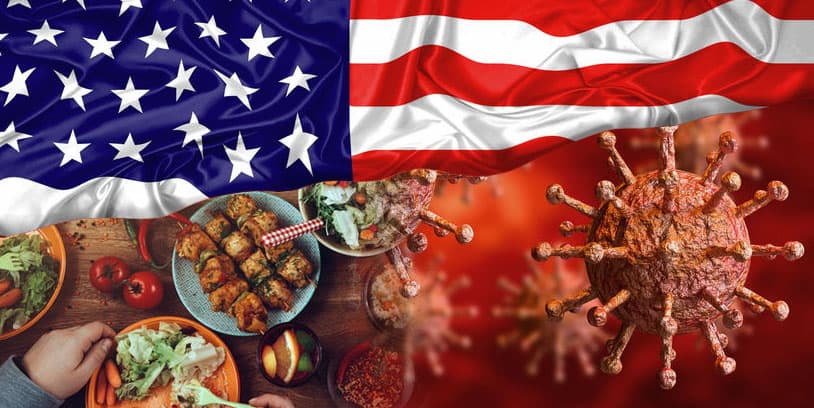
Can the food industry survive the impact of the coronavirus? And, is it safe to eat food imported from China or abroad?
Coronavirus represents a major threat to the performance of food makers across the food and beverage industry. Food and drink giants Danone and Diageo have warned that the outbreak will cost them millions of dollars in sales and hurt profits.
As of Feb. 26, 2020 Johns Hopkins University’s Center for Systems Science and Engineering reports that there are 81,322 confirmed cases of Covid-19 (Coronavirus) worldwide, and roughly 2,770 confirmed deaths from the illness.
As the number of individuals infected with the Novel Coronavirus continues to climb, what will be the effects on the food industry? Let’s dive right in.
The state of Coronavirus In The Food Industry
Let’s take a look at how coronavirus is affecting the food industry in various parts of the world.
- McDonald’s and Starbucks were among the first companies
to announce temporary closures in January, in an attempt to prevent the
spread of the virus among employees and customers.
- Coca-Cola
Co. published a news release about the expected impact from COVID-19 on
its first-quarter 2020 results. It’s “currently estimating an
approximate 2- to 3-point impact to unit case volume, 1- to 2-point
impact to organic revenue and 1- to 2-penny impact to earnings per share
for the first quarter.
- In China, the wine and restaurant
industries are devastated. Many restaurants in major cities like
Shanghai, Macau, Guangzhou, and Hong Kong were ordered to close
completely for three weeks.
- Meituan, a major delivery
provider in China with 700,000 active daily couriers and 5.9 million
partner retailers, including global chains like McDonald’s and Pizza
Hut, has seen an increase in contactless delivery service. More than 80%
of all orders requested a contactless delivery.
- Meituan’s
grocery delivery service has surged in demand. The number of grocery
orders made during the two weeks when the data was collected increased
four times over the same period last year. Masks, sterilizers,
vegetables, meat, and fruit were the most ordered items.
- Diageo, the maker of Johnnie Walker, Smirnoff, Guinness, and Captain Morgan, warned that sales could be hit by as much as $421 million in the 2020 fiscal year. Earnings could be dented by up to $259 million.
- Chile’s wine association reported that exports to China are down 50% for February.
- Supermarket shelves in some Italian towns emptied as coronavirus crisis grows
- The Italian government has quarantined 11 towns in northern Italy. In Milan, bars must close by 6 p.m.
- Mondelez, which usually enjoys an increased snack and candy sales during the Chinese new year, saw lower sales said Chairman and CEO Dirk Van de Put. While shipments to retailers have resumed, many of the shops have not reopened.
- Danone, which makes Evian bottled water and Alpro yogurt, said it expects the coronavirus to shave $109 million off sales in the first quarter, mostly in its bottled water business in China. Sales growth in the quarter is now expected to be “broadly flat,” it added.
- Survival experts said Australians should start building a good supply of dried foods.
Corona vIRUS IN tHE U.S.
In the USA, cases have been confirmed in seven states, and hundreds of people have been placed under quarantine. If a pandemic should break out in the United States, we can expect the market to behave similarly to what we’ve seen in other countries.
There are several concerns regarding the impact of the coronavirus on the U.S. food industry.
- The supply chain: If your business relies on products, ingredients, or supplies from China, you may be choked off from suppliers, workers, and logistics networks. China’s manufacturing base is facing a multitude of unprecedented challenges, as coronavirus containment efforts hamper factories’ attempts to reopen. This may cause shortages in the food industry and sourcing from unreliable places.
- Can you get infected through food? Although there is no evidence and it’s unlikely that the virus will be transmitted via contaminated food or imported products say the FDA, it may be possible that a person can get COVID-19 by touching a surface or object that has the virus on it and then touching their own mouth, nose, or possibly their eyes, but this is not thought to be the main way the virus spreads states the Center for Disease Control and Prevention.
- A colleague that traveled to China: If someone in your workforce has been to China or has become infected with COVID-19, you need to be proactive and follow your local health department advice to control the spread.
FDA
US Food and Drug Administration is paying close attention to the potential challenges the virus might pose. “FDA is keenly aware that the outbreak will likely affect the product supply chain, including potential disruptions to suppliers [and] shortages of critical medical products in the U.S,” FDA Commissioner Dr. Stephen Hahn told reporters Tuesday. While the FDA is not able to conduct inspections in China right now, this is not hindering their efforts to monitor medical products, and food safety officials said.
Amazon, Walmart & Apple’S TAKE
Amazon is cracking down on listings to make its marketplace safe from the coronavirus and a possible spread. Amazon is working hard to avoid disruptions in its supply chain. According to a CNN report, Amazon’s dependence on Chinese manufacturers shows what’s to come for other stores.
Companies like Apple are expecting low sales, and airlines are experiencing high canceling flights to China and other parts of countries affected by the coronavirus.
Retailers have so far said less about how the coronavirus will affect them. Walmart said sales at its 430 stores in China had not faltered and added that the impact on its supply chain was unclear but might be more muted than at other companies.
Unilever’s CFO Graeme Pitkethly summed it best: “Right now, China is a big question mark.”